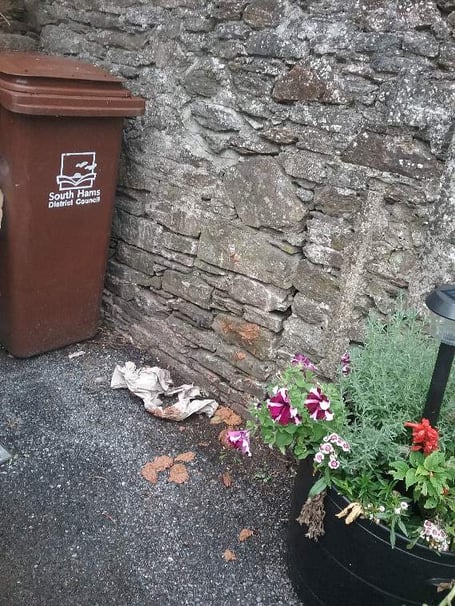A serial pooper is making a resident’s life a misery and even the installation of motion sensors and security lights have failed to curb the problem.
Joseph Rogers, who lives at Mill Tail in Totnes town centre, has repeatedly been greeted by human defecation on his driveway when he gets up in the morning. He has filmed people loitering around in his driveway but has not yet caught the serial pooper in action.
He believes the problem may be due to the fact he lives very close to the public toilets, which are shut at 6pm to prevent drug taking and antisocial behaviour.
The adjacent bus stop is a popular site for rough sleepers and Mr Rogers reports being woken in the night repeatedly by disturbances in the street outside.
A police spokesman said: “We are not aware of any issues in relation to human defecation in the area.
“If this is happening, it will be during the hours of darkness when the toilets have long been locked up.”
Operation Applerose was established in July 2017 to deal with street antisocial behaviour, including drug dealing and use, street drinking and begging.
The police said: “Underpinning much of this is homelessness. Since the operation began, several long-term street attached persons have been found accommodation and are engaging with support services for help with substance abuse. We continue to deal with persons dealing and using drugs and enforcing the no drinking zone.
“We are working with the council to target repeat offenders in relation to antisocial behaviour.
“We have found that as soon as one individual has been supported away from the street, another has arrived in Totnes. And another, and another.
“We have seen that Totnes seems to attract street attached persons from elsewhere to the town.
“We currently have an influx of persons from Plymouth and Exeter. Most of these persons come with their own issues, low-level criminal history in relation to antisocial behaviour. We are now getting to know these people, how they can be helped and deter them away from the street antisocial behaviour.
“We are aware that some of these people have taken to sleeping in bus stops, sheltering from the conditions.
“Most are gone well before the bus stops start to become busy and each morning, when resources allow, we attend to move people on.
“During the night, I see no need to move people on as my view is that they are less vulnerable there, easy to locate and check on their welfare and the bus stops are not in use. This is not a blanket endorsement to use the bus stops to sleep, as we will deal with antisocial behaviour where other persons are effected, but when people have the choice of there or a cold damp doorway subject to the elements, I know which I would prefer.”





Comments
This article has no comments yet. Be the first to leave a comment.